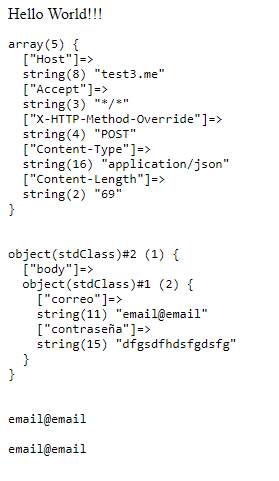Estaba tratando de realizar una petición post en php mediante el uso de file_get_contents pero al momento de pasarle los headers al parecer no me los tomaba ya que siempre especificaba otro Content-type al que le había puesto por defecto. Dado a ese problema decidí usar curl para realizar la petición, tal que así:
function send_post(string $url, array $headers, array $body){
$headers["Host"] = $this->host;
$headers = $this->arrHeader_from_array($headers);
$ch = curl_init();
curl_setopt($ch,CURLOPT_URL, $url);
curl_setopt($ch,CURLOPT_POST, true);
curl_setopt($ch,CURLOPT_POSTFIELDS, $body);
curl_setopt($ch,CURLOPT_RETURNTRANSFER, true);
curl_setopt($ch, CURLOPT_HTTPHEADER, $headers);
$result = curl_exec($ch);
return "--->".$result;
}
La función arrHeader_from_array lo que hace es convertir un array asociativo con esta estructura (resultado de un var_dump):
array(7) {
["Accept"]=>
string(3) "*/*"
["Content-Type"]=>
string(16) "application/json"
["Content-Length"]=>
string(2) "67"
["Accept-Encoding"]=>
string(17) "gzip, deflate, br"
["Host"]=>
string(14) "127.0.0.1:8080"
["Connection"]=>
string(5) "close"
}
A algo como esto:
array(7) {
[0]=>
string(11) "Accept: */*"
[1]=>
string(30) "Content-Type: application/json"
[2]=>
string(18) "Content-Length: 67"
[3]=>
string(34) "Accept-Encoding: gzip, deflate, br"
[4]=>
string(22) "Host: http://127.0.0.1"
[5]=>
string(17) "Connection: close"
}
Y como body se le pasa lo siguiente:
array(2) {
["username"]=>
string(17) "[email protected]"
["password"]=>
string(8) "password"
}
Al final el resultado que obtengo es esto:
---><!DOCTYPE HTML PUBLIC"-//W3C//DTD HTML 3.2 Final//EN">
<title>400 Bad Request</title>
<h1>Bad Request</h1>
<p>Failed to decode JSON object: Expecting value: line 1 column 1 (char 0)</p>
Por pura curiosidad se me ocurrió cambiar el contenido del body de la petición curl
...
curl_setopt($ch,CURLOPT_POSTFIELDS, 'postvars=val1&postvars2=val2');
...
Y resulta que mi servidor no devuelve ninguna respuesta, quedo esperando por un largo tiempo y tengo que reiniciar el servidor.
El código completo es el siguiente:
<?php
class Redir {
function __construct(string $url, int $port){
$this->host = $url;
$this->port = $port;
}
function arrHeader_from_array(array $headers){
$arr_header=[];
foreach($headers as $header=>$value){
array_push($arr_header,"$header: $value");
}
return $arr_header;
}
function send_post(string $url, array $headers, array $body){
$headers["Host"] = $this->host;
$headers = $this->arrHeader_from_array($headers);
$ch = curl_init();
curl_setopt($ch,CURLOPT_URL, $url);
curl_setopt($ch,CURLOPT_POST, true);
curl_setopt($ch,CURLOPT_POSTFIELDS, $body);
curl_setopt($ch,CURLOPT_RETURNTRANSFER, true);
curl_setopt($ch, CURLOPT_HTTPHEADER, $headers);
$result = curl_exec($ch);
return "--->".$result;
}
static function getallheaders(){
foreach($_SERVER as $K=>$V){
$a=explode('_' ,$K);
if(array_shift($a)=='HTTP'){
array_walk($a,function(&$v){
$v=ucfirst(strtolower($v));
});
$retval[join('-',$a)]=$V;
}
}
return $retval;
}
function start(){
$req = $_SERVER["REQUEST_METHOD"];
if ($req == "POST"){
$route = $_SERVER['REQUEST_URI'];
$body = json_decode(file_get_contents('php://input'), true);
//print_r($body);
$url = "$this->host:$this->port".$route;
$headers = $this->getallheaders();
//print_r($headers);
echo $this->send_post($url, $headers, $body);
return;
}
}
}
?>
Y el servidor que recibirá la petición es un servidor python hecho con flask:
@app.post("/data")
def data():
print(request.json, request.headers)
return "yep"
Al enviar la información usando json_encode($body) el problema es el mismo, la petición no envía respuesta y parece ser eterna.
Entonces ¿Cómo es que debo hacer la petición curl?

$bodycomo JSON en lugar de un arreglo?curl_setopt($ch,CURLOPT_POSTFIELDS, json_encode($body));localhost:8080recibe una peticiónposty realiza la misma petición alocalhost:4000el cual es un servidor en python, que lo único que tiene es unprint(request.headers); return "yep"